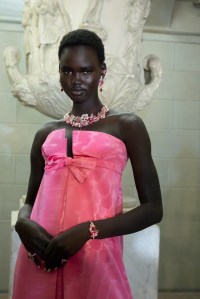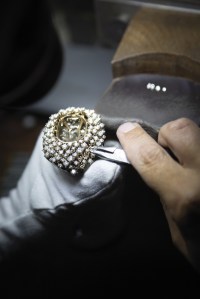
A 100-karat Blue Sapphire Necklace Speaks Volumes About Damiani’s Legacy Over 100 Years
MILAN — A cushion-cut, 100-karat blue sapphire sourced in Sri Lanka has been safeguarded for years until the time for a big-ticket celebration arrived.
Set in a diamond-encrusted frame and turned into a pendant named “Mimosa Eternal Blue” to be worn as a necklace or brooch, it exemplifies the upbeat mood surrounding Damiani’s 100th anniversary.
The storied high jeweler — founded in Valenza, Italy, in 1924 by Enrico Grassi Damiani and loved by celebrities from Sharon Stone and Tilda Swinton to Sophia Loren and Gwyneth Paltrow — is mounting an exhibition at Milan’s Gallerie d’Italia on Piazza della Scala will display 100 one-of-a-kind jewels to showcase the brand’s craftsmanship, design ethos, legacy and avant-garde spirit.
“We are a company doing an artisanal product by nature, with little technology [involved], hence tradition is ingrained in our roots, and so is respect toward our history, not just as a [company] value but because the product itself [requires it] as it’s all handmade,” Guido Grassi Damiani, president of Damiani Group, told WWD ahead of the exhibit’s opening on March 19.
Inside the Damiani atelier where the Mimosa Eternal Blue pendant is crafted.
Courtesy of Damiani
The 100 exhibition pieces are all new and crafted using striking gemstones in part drawn from the Damiani family’s private collection to convey a sense of the know-how amassed over a century and to spotlight the evolution of the brand’s design ethos, one that has changed only subtly throughout its history, the group president contended.
He touted his grandfather Enrico Grassi Damiani for setting the design and manufacturing bedrock of the company, managing to build a sizable business by word of mouth. The jeweler eventually turned into a full-fledged label in the 1970s thanks to Damiano Damiani, the founder’s son, who propelled its branding and started to invest in communication.
It should come as no surprise, then, he contended, that out of the original atelier, Damiano Damiani nurtured the flagship Damiani label and established the Salvini brand in 1986.
The Damiani Group also comprises the Bliss brand introduced in 2000; jeweler Calderoni, which was acquired in 2006; retailer Rocca bought in 2008, as well as the leading glassmaker Venini, which the group first invested in in 2016.
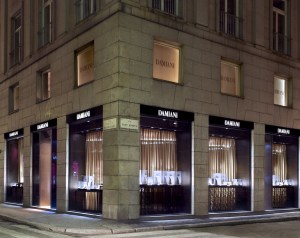
The Damiani boutique on Milan’s Via Montenapoleone.
Courtesy of Damiani
If manufacturing prowess has been nurtured and preserved over a century, with craftspeople passing down their know-how to new generations (the company has an internal academy to train new-gen artisans), the overall company’s history points to a forward-looking agenda that traverses the three generations at its helm.
“This [approach] has always defined the company, since my father started investing in communications, which was overlooked in the jewelry sector. At the beginning, the ad campaigns that my father would conceive were viewed as ‘weird’ for tapping into international ambassadors, a practice that was not even so common in fashion” at that time, Damiani explained.
To be sure, Damiani has over the years tapped a roster of A-listers for its campaigns, from Brad Pitt and Isabella Rossellini to Sharon Stone and Jennifer Aniston.
A lot has taken place over 100 years, including winning 18 Diamonds International Awards for its jewels and publicly listing in Milan, only to delist 12 years later, to the acquisitions. But Damiani contended that the turning points have always coincided with generational handovers.
The family’s third generation is represented by Damiani and his siblings Silvia, vice president of Damiani Group and president of Venini, and Giorgio, vice president of Damiani Group and creative and research and development director for all jewelry brands within the group. They found themselves suddenly helming the family business following the tragic death of their father Damiano in a car accident in 1996.
“We inherited the company when we were very young, not even 30,” he said, underscoring that it was a structured one, but that his generation further developed it internationally, expanding its retail network.
The centennial exhibition, titled “Damiani 100 x 100 Italiani,” is to travel internationally after its Milan leg wraps on April 28, as a singular beacon of “italianness.”
“We are the last ones standing. Storied Italian [jewelry] names have now international owners. Not only that, we are the last remaining Italian, family-owned business in the sector, based out of Valenza, where we not only have been manufacturing goods forever, but where we are actually living since at least the 17th century,” he said. “Other companies are great luxury players, but we are true jewelers.”
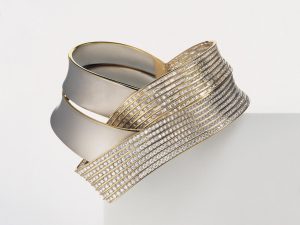
Damiani’s Spaziale necklace.
According to exhibition curator Alba Cappellieri, professor of jewelry design at Milan’s Politecnico University, that Italian ethos ingrained in Damiani’s design is intertwined with the Italian way of living and conceiving craft.
From the Margherita Desert Garden necklace featuring a 20-karat, pear-shaped fancy diamond in the rare deep brown, yellow coloration to the Belle Epoque Frame white gold bracelet shaped as a cinematographic film with frames embellished with baguette-cut diamonds and fancy diamonds in different cuts, the exhibit provides an opportunity for visitors to discover pieces that are rarely in the public’s eye for the rarity of the gemstones and elaborate designs.
“Our products are a bit like artworks, with high value for the raw materials employed and craftsmanship… we believed it was important to show how the company has preserved an artisanal profile although our size has become industrial,” Damiani said.
In addition to the roving exhibition, to be feted with a gala dinner on March 14 that is expected to draw the likes of Jessica Chastain and Sophia Loren, among other celebrities, the brand’s centennial will be marked by capsule collections and linkups with other brands, Damiani teased, declining to reveal additional details.
The company has sourced some of the rarest and most striking gemstones, such as rubellite and other tourmalines, as well as tasmanite and diamonds, all worked according to heritage designs, including the Mimosa, Margherita and Belle Epoque styles. When the yearlong traveling exhibition closes, the jewelry pieces will be available for purchase.
“We sell products that should last forever,” Damiani said, highlighting the inherent timelessness of jewelry.
Continuity is indeed a key priority for the executive and the family.
Grassi Damiani didn’t rule out listing again in the future, recognizing all the benefits the Damiani Group garnered throughout its 12 years as a public company. The group had its first gig with the Milan Bourse in 2007 and delisted in 2019, citing misalignment between the management’s strategic plans and shareholders’ expectations.
In fiscal 2023 ending March 31, the Damiani Group is poised to post revenues of 300 million euros, a double-digit increase over the previous year. Grassi Damiani is confident that despite the geopolitical instability and macroeconomic volatility expected throughout 2024, the family business can sustain its momentum.
“I’m not that worried by the market, I think that…in the aftermath of the COVID-19 pandemic people were all about revenge spending and returning to hang out and enjoy life.…After a binge, a settlement is normal,” the executive said.
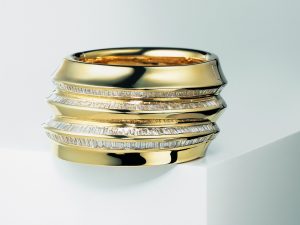
Damiani’s Vulcano bracelet.
“I hope that the negative forecasts that are circulating are a little bit too pessimistic,” he added. “We have a long-long-term vision, we always look at [ensuring continuity for] the next generation, rather than by quarters,” he said.
In 2024 the company plans to expand its footprint in the Middle East, which is currently underrepresented, with about eight to nine openings in the Gulf area over the next 12 months. The Asian market is becoming increasingly important, with South Korea and Japan nabbing the biggest slice, followed by China, where the company established a venture in 2020 with Yuyuan Jewelry & Fashion Group, a subsidiary of Chinese conglomerate Lanvin Group, previously known as Fosun International. That joint venture has been since taken over by Damiani Group, which plans to open five to six stores in the country this year. Despite its link with Hollywood celebrities, Grassi Damiani contended that the U.S. is less attracted to the brand’s subtler designs than the Far East.

Guido Grassi Damiani, president of Damiani Group.
Courtesy of Damiani
